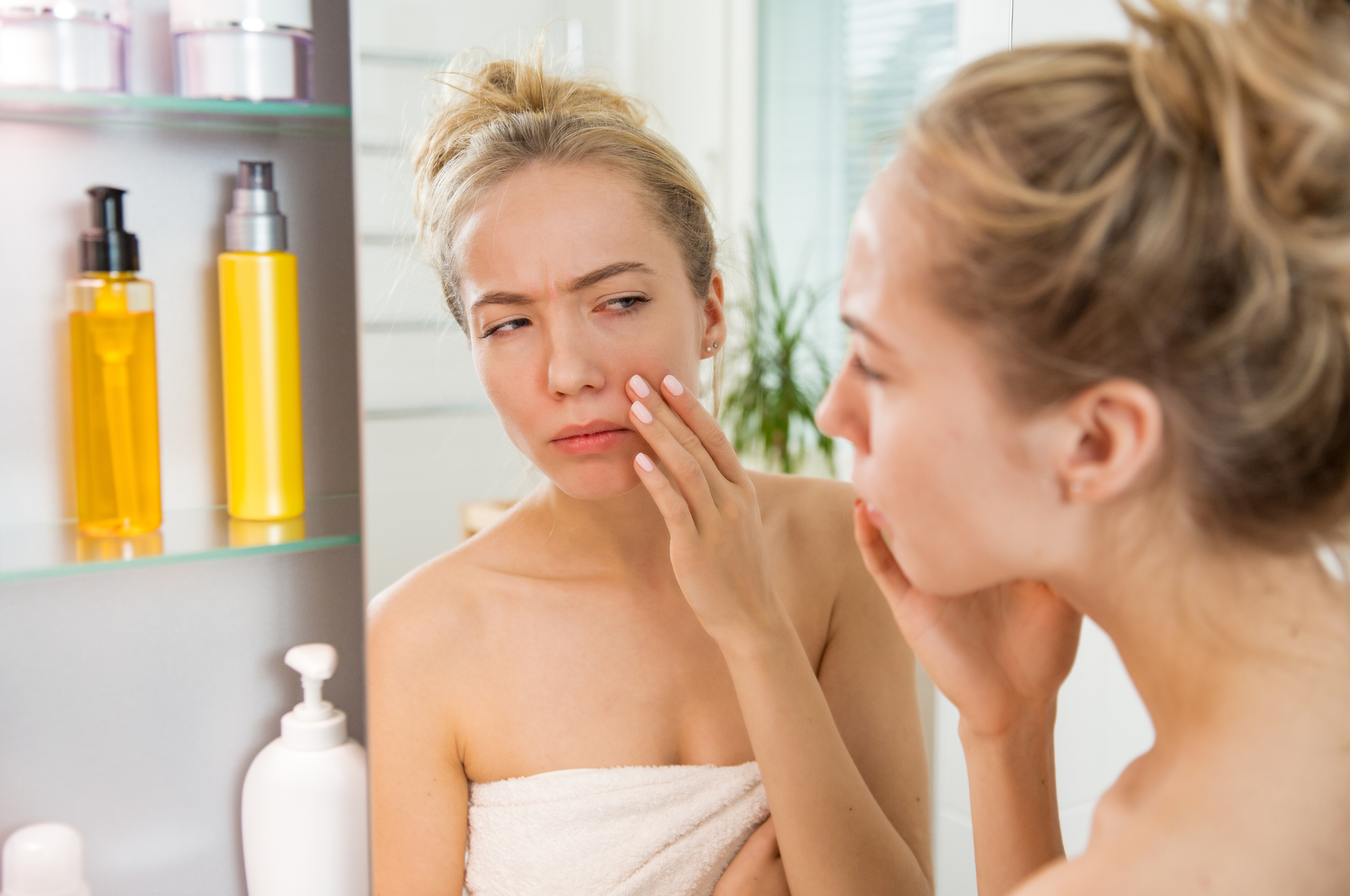It’s one of the biggest skincare questions out there: “is my skin dehydrated or dry?”
Usually, it’s a dilemma that can be tricky to solve on your own, and when treated incorrectly, it can be incredibly irritating and dissatisfying.
If you’ve ever been conflicted with the question “do I have dehydrated or dry skin,” we’re here to set the record straight with these two (shockingly different) skin concerns.
Dry vs Dehydrated Skin: Key Differences

Dry and dehydrated skin share similar characteristics, such as feeling tight, itchy, flaky, and sensitive, but there are some key distinctions to look out for.
Let’s begin with some basic characteristics: dryness is a skin type that tends to produce less sebum (oil), and it can often appear dull or ashy. The skin may also show signs of aging like fine lines and wrinkles. No matter how much water you splash on your face, it returns to dry within moments, perhaps even featuring a thin, paper-like texture.
Dehydrated skin, meanwhile, is a skin condition in which water levels are low. Typically, this condition looks scaly and red, often accompanied by feelings of itchy, flaky skin and dark circles around the eyes. To treat dehydrated skin, it’s going to take more than your daily eight glasses to replenish; you need to hydrate your body from the inside out. This is when hyaluronic acid becomes your skin’s best friend.
How to Know if My Skin Is Dry or Dehydrated
Think of the skin as an orange peel: it is tight, shiny, and pitted.
When the skin is dehydrated, it tends to feel tight, produces more oil, and has larger pores. Does your face ever feel oily and dry–at the same time? Do you often find yourself dealing with acne or breakouts? If you can relate to either, your skin is probably dehydrated.
Dry skin, meanwhile, has a rough texture, tiny pores, and red, irritated patches. If you wear makeup and notice that it is absorbed quickly throughout the day, it is likely that your skin is dry.
What Causes Dehydrated Skin and Dry Skin?

Whether your skin is dry or dehydrated, there is much more going on below the surface.
For instance, dehydrated skin occurs as a side effect from a lack of water in the skin barrier. Dry skin, on the other hand, is a skin type, meaning that it is genetic. This differs from dehydrated skin, which is a skin condition.
Dehydrated skin is often a result of cold air, dry weather, choosing to bathe or shower in excessively hot water, air conditioning, poor sleep, and harsh skin care products. With dry skin, you’ll likely notice that dryness is a recurring issue, regardless of outside factors.
Skin Types vs. Skin Conditions: What Is the Difference?
Both skin types and skin conditions describe the current state of your skin, but they do so in different ways.
Skin types, like dry skin, are genetic and typically occur over the entire body, including your hands and scalp. Skin types also include combination, and normal, and oily skin, and each type comes with its own unique set of needs. While you can’t change the fact that you have a dry skin type, it can be managed and maintained. While those with a dry skin type may sometimes experience flakiness and cracking skin, giving it the right products will keep it glowing, vibrant and soft.
Dry skin types need oil-rich products such as:
- iS Clinical Cleansing Complex is a hydrating cleanser that not only breaks down surface oil, dead skin cells and makeup, but increases the skin’s ability to retain moisture while combating signs of aging.
- Sanitas Sensitive Skin Moisturizer can be used as a daily moisturizer to replenish your skin’s natural moisture. Bonus, Atopalm can be used over your entire body as well.
Other skin care ingredients for dry skin include:
- Squalane
A plant-derived ingredient known for mimicking the weight and texture of sebum, which is the natural oil our skin produces.
- Glycerin
A vegetable-based compound that works as a humectant, meaning that it pulls water from the air and the deeper layers of your skin to the skin’s surface.
- Apricot kernel oil
A non-greasy, lightweight emollient known to support the skin’s natural healing process, making it a favorite for acne-prone skin.
- Colloidal oatmeal
A soothing, softening skincare ingredient that is known to bind and lock in moisture, which promotes hydration and healing in the skin.
Skin Conditions, like dehydrated skin, are a result of controlled factors like lifestyle/habits, diet, environment, incorrect product use, and other factors both inside and outside of your body. Other skin conditions can include atopic dermatitis, acne, and rosacea. Unlike skin types, skin conditions can be treated and altered. However, they can reoccur, so regular maintenance may be necessary.
Dehydrated skin needs water-rich skin care products; it also helps to incorporate an emollient at night to trap in water, like petroleum jelly. Since any skin type can be dehydrated, I like to use products made for all skin types. Try sticking with fragrance-free serums and other corrective treatment products, and don’t forget to apply moisturizer. Some of our favorite products include:
- iSClinical Active Serum is powerful in results but gentle enough for all skin types and daily use. It addresses dehydration, while reducing concerns like hyperpigmentation and pore size.
- Revision Skincare, Soothing Facial Rinse is a daily toner that is oil and alcohol-free. The soothing facial rinse is not only hydrating but calming as well.
Other skin care ingredients for dehydrated skin include:
- Hyaluronic acid
A plumping, hydrating ingredient that deeply penetrates the skin.
- Sodium PCA
A naturally occurring humectant that binds water droplets to the surface of the skin.
- Aloe vera
A versatile ingredient known for soothing burns, promoting healing, and easing redness while replenishing the skin with hydration.
- Provitamin B5
A protective, anti-inflammatory ingredient that’s known to stimulate the skin’s natural healing process.
Whether your skin is dry or dehydrated, a proper skin care routine can bring overall balance and result in healthy skin. You can find my favorite products above and much more at the online store.


